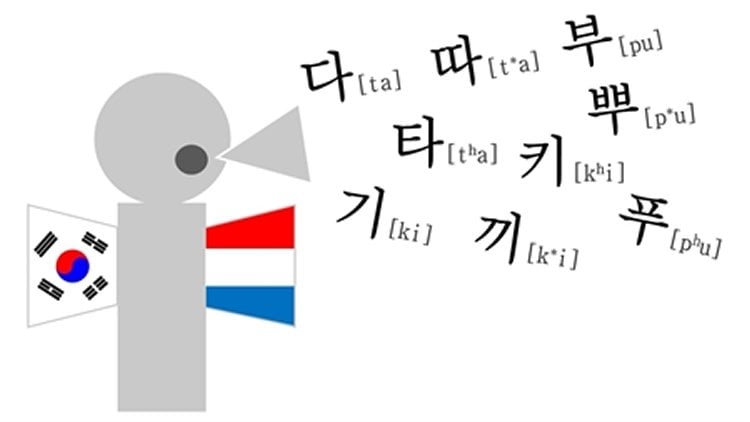Summary: A new study reports adoptees who had early life exposure to their native language may subconsciously retain retain fragments of the language structure, even if no conscious memory of the language remains.
Source: Radboud University.
Language learning very early on in life can be subconsciously retained even when no conscious knowledge of the early experience remains. The subconscious knowledge can then be tapped to speed up learning of the pronunciation of sounds of the lost tongue. A paper describing these results of language scientists from Radboud University, Western Sydney University and Hanyang University has been published in Royal Society Open Science on January 18.
Decades after their adoption, Korean adoptees are better in pronouncing Korean sounds than control participants, even if they were only a few months old at the moment of their adoption. That is shown in a study of international adoptees by Mirjam Broersma, language scientist at Radboud University and the Max Planck Institute for Psycholinguistics (MPI), Anne Cutler (chief investigator at the ARC Centre of Excellence for the Dynamics of Language – CoEDL – and Western Sydney University) and Jiyoun Choi of Hanyang University (previous postdoc at CoEDL). Their results show that babies start with the learning and storing of speech sounds much earlier than was hitherto known.
The experiment involved 29 Korean-born Dutch speakers and an equal-sized native Dutch-speaking control group. Throughout a two-week period of training, the adoptees were asked to identify three Korean consonants and then to try and reproduce them – the sounds were unlike anything in Dutch (listen to the fragments below). All of the spoken productions collected in the experiment were then rated by Korean listeners.
Adoptees’ attempts at articulating the correct sound improved significantly more across the training period than control participants’ scores, and, for adoptees only, the production success correlated significantly with rate of learning to identify the sounds, which also surpassed that of the controls.

“One of the most interesting findings was that no difference showed in the learning results of those Korean-born participants adopted under six months of age and those adopted after the age of seventeen months”, Mirjam Broersma explains. “This means that even in the very early months of life, useful language knowledge is laid down, and what has been retained about the birth language is abstract knowledge about what patterns are possible, not, for instance, words.”
Significant learning occurs in the womb and first six months of life but up until now it wasn’t clear what of that learning might be retained even without any further input in the language, and how it could be usefully called upon for language (re-)learning.
For people adopted internationally this is good news, especially as many of them try to reconnect with the people and culture of their birth countries. As the authors stress in their paper, lasting cognitive and linguistic abilities are being laid down even in the earliest months of life.
Source: Dr. Mirjam Broersma – Radboud University
Image Source: NeuroscienceNews.com image is adapted from the Radboud University press release.
Original Research: Full open access research for “Early development of abstract language knowledge: evidence from perception–production transfer of birth-language memory” by Jiyoun Choi, Anne Cutler, and Mirjam Broersma in Royal Society Open Science. Published online January 18 2017 doi:10.1098/rsos.160660
[cbtabs][cbtab title=”MLA”]Radboud University “Adoptees Advantaged By Birth Language Memory.” NeuroscienceNews. NeuroscienceNews, 18 January 2017.
<https://neurosciencenews.com/birth-language-memory-5963/>.[/cbtab][cbtab title=”APA”]Radboud University (2017, January 18). Adoptees Advantaged By Birth Language Memory. NeuroscienceNew. Retrieved January 18, 2017 from https://neurosciencenews.com/birth-language-memory-5963/[/cbtab][cbtab title=”Chicago”]Radboud University “Adoptees Advantaged By Birth Language Memory.” https://neurosciencenews.com/birth-language-memory-5963/ (accessed January 18, 2017).[/cbtab][/cbtabs]
Abstract
Early development of abstract language knowledge: evidence from perception–production transfer of birth-language memory
Children adopted early in life into another linguistic community typically forget their birth language but retain, unaware, relevant linguistic knowledge that may facilitate (re)learning of birth-language patterns. Understanding the nature of this knowledge can shed light on how language is acquired. Here, international adoptees from Korea with Dutch as their current language, and matched Dutch-native controls, provided speech production data on a Korean consonantal distinction unlike any Dutch distinctions, at the outset and end of an intensive perceptual training. The productions, elicited in a repetition task, were identified and rated by Korean listeners. Adoptees’ production scores improved significantly more across the training period than control participants’ scores, and, for adoptees only, relative production success correlated significantly with the rate of learning in perception (which had, as predicted, also surpassed that of the controls). Of the adoptee group, half had been adopted at 17 months or older (when talking would have begun), while half had been prelinguistic (under six months). The former group, with production experience, showed no advantage over the group without. Thus the adoptees’ retained knowledge of Korean transferred from perception to production and appears to be abstract in nature rather than dependent on the amount of experience.
“Early development of abstract language knowledge: evidence from perception–production transfer of birth-language memory” by Jiyoun Choi, Anne Cutler, and Mirjam Broersma in Royal Society Open Science. Published online January 18 2017 doi:10.1098/rsos.160660






